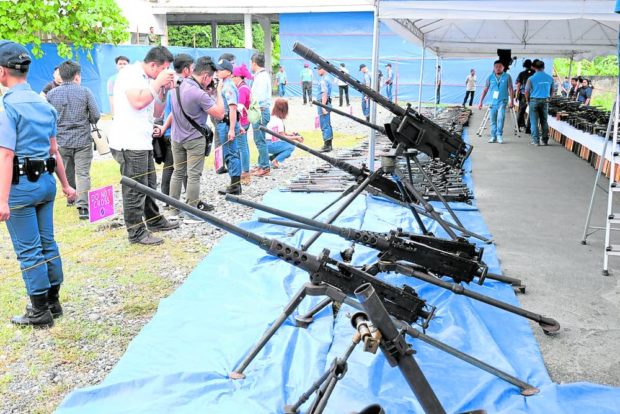MILF laments ex-Moro rebels not getting promised benefits

DECOMMISSIONED | Authorities place on display the surrendered weapons of former Moro Islamic Liberation Front rebels that were deactivated during the Phase 2 decommissioning ceremony in September 2019. (Photo by BONG S. SARMIENTO / Inquirer Mindanao)
COTABATO CITY, Maguindanao, Philippines — The Moro Islamic Liberation Front (MILF) and the independent Third Party Monitoring Team (TPMT) have lamented the slow implementation of the Bangsamoro peace process’ normalization phase, which they observed has been lagging far behind the political track.
Ahod “Al Haj Murad” Ebrahim, MILF chair and interim chief minister of the Bangsamoro Autonomous Region in Muslim Mindanao (BARMM), attributed the delay to the lack of funding from the national government, which failed to include it in the General Appropriations Act (GAA) this year.
Ebrahim said the normalization track of the Comprehensive Agreement on the Bangsamoro should have been implemented parallel and complementary to the provisions of Republic Act No. 11054 or the Organic Law for the BARMM.
“But the normalization is very much lagging behind the political track [of the peace process],” he told reporters on Thursday afternoon at the Bajau Hall of the Bangsamoro Government Complex here.
The normalization track provides for the decommissioning of MILF forces and weapons, the transformation of six recognized MILF camps into peaceful and productive zones, the disbanding of private armed groups, granting of amnesty to MILF members, and the redeployment of the Armed Forces of the Philippines from or within the Bangsamoro region, among others.
But although the decommissioning process is now on its third phase, with the last 35 percent of former MILF combatants turning in their weapons to be kept “beyond use,” the socioeconomic package that combatants expect to get from the government to rebuild their lives had been lacking.
Ebrahim noted that the Office of the Presidential Adviser on Peace, Reconciliation and Unity (OPAPRU) had been lobbying the different national government agencies to pour funds or projects aligned with the targets under the normalization phase.
Since funding from the agencies of the national government for the programs under normalization is limited, Ebrahim said there were suggestions to use the region’s block grant, the BARMM’s main source of revenue, as stipulated in RA 11054 (Bangsamoro Organic Law).
Block fund for other uses
The annual block grant, which is automatically appropriated in the GAA, is released directly to the BARMM government, which this year has an approved budget of P79.86 billion. But Ebrahim said they could not use the block grant to fund the normalization aspect as it has been allocated to the various expenditure programs of the Bangsamoro government.
He stressed the delay in the completion of the different provisions of normalization could have a bearing on the signing of the exit agreement in 2025, the end of the extended transition period for the interim Bangsamoro government.
Ebrahim said the decommissioning of the 40,000-strong Bangsamoro Islamic Armed Forces (BIAF), the armed wing of the MILF, had been one of the significant aspects of the normalization process.
It is currently in its third phase, involving 14,000 combatants or 35 percent of the MILF-BIAF members.
The second phase was completed in March 2020, involving 12,000 individuals or 30 percent of the MILF combatants, but the promised socioeconomic package of P1 million for each of the decommissioned combatants has not been fulfilled by the national government.
During the deliberation for Opapru’s proposed 2022 budget in September last year, Secretary Carlito Galvez Jr. said the amount consisted of P100,000 in immediate cash assistance, together with noncash benefits such as study grants, skills training, and social protection based on the result of the needs assessment conducted for each of the decommissioned combatants.
Galvez has then noted that the BIAF fighters even wrongly thought they would receive P1 million in cash each, which, he stressed, actually involved a 10-year program for the combatants.
Limited way
Heino Marius, chair of the TPMT, which the government and the MILF established to monitor the implementation of the Bangsamoro peace agreement, also noted that even with the third phase of the decommissioning process, the socioeconomic support for the deactivated combatants had been “coming in a limited way” and that the transformation of former rebel camps has yet to fully implemented.
He also noted that the National Amnesty Commission had yet to be constituted, which meant that the granting of amnesty to MILF members, as provided for in the Annex of Normalization, had not been complied with.
RELATED STORIES
Decommissioning of MILF fighters, weapons resumes
New BTA unites former warring MILF, MNLF rebels
Marcos tells BTA: Gains in BARMM impressive, but more remains to be done